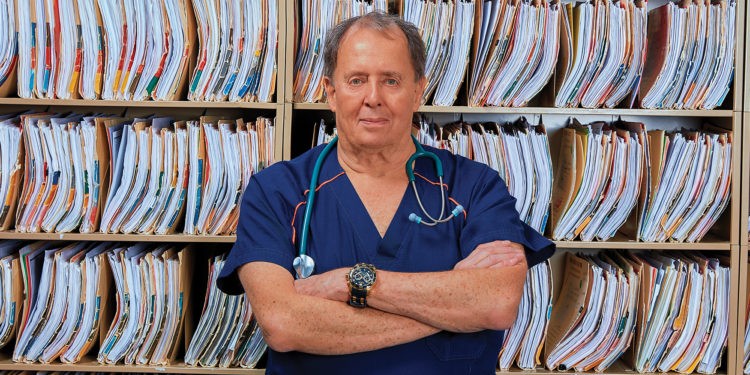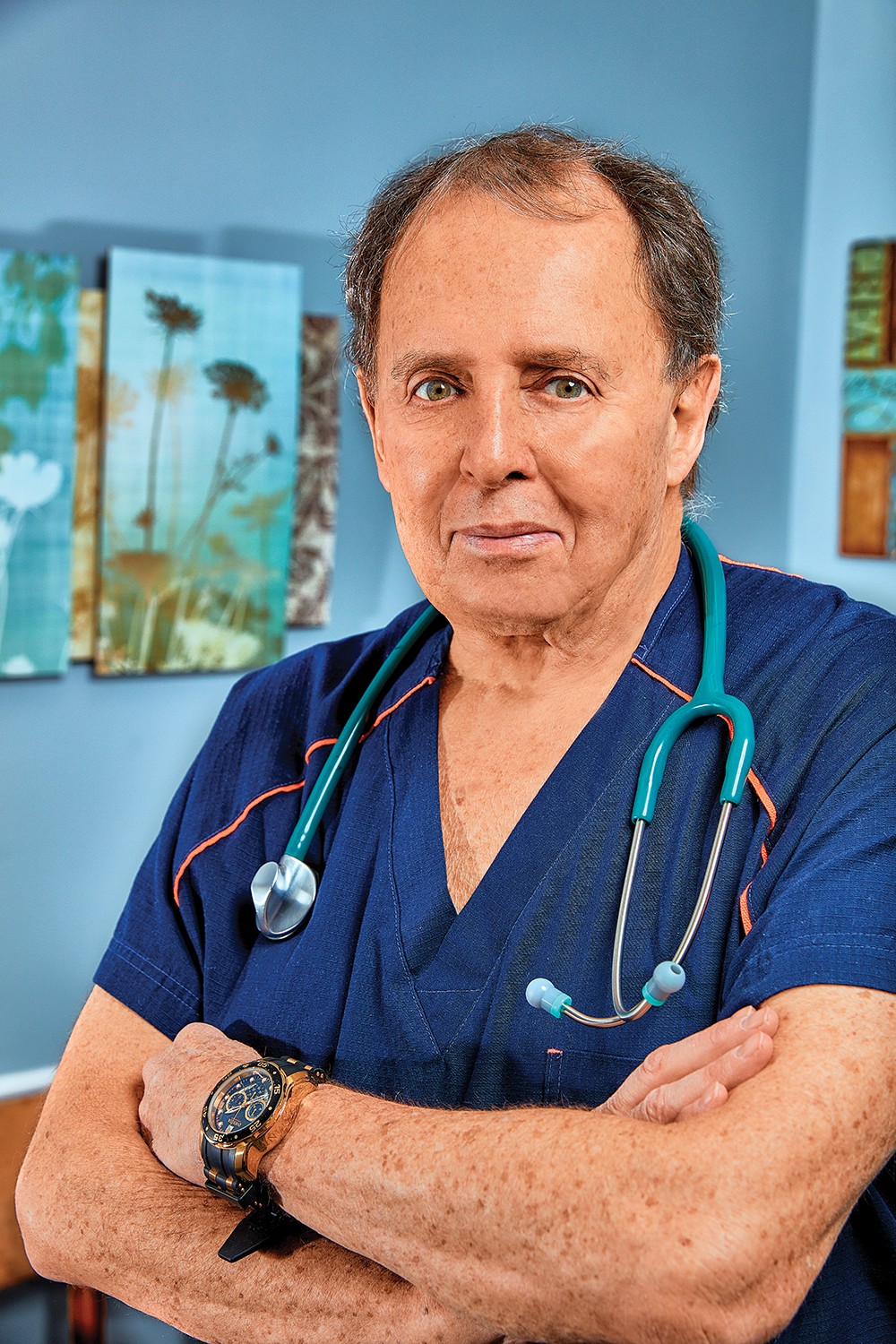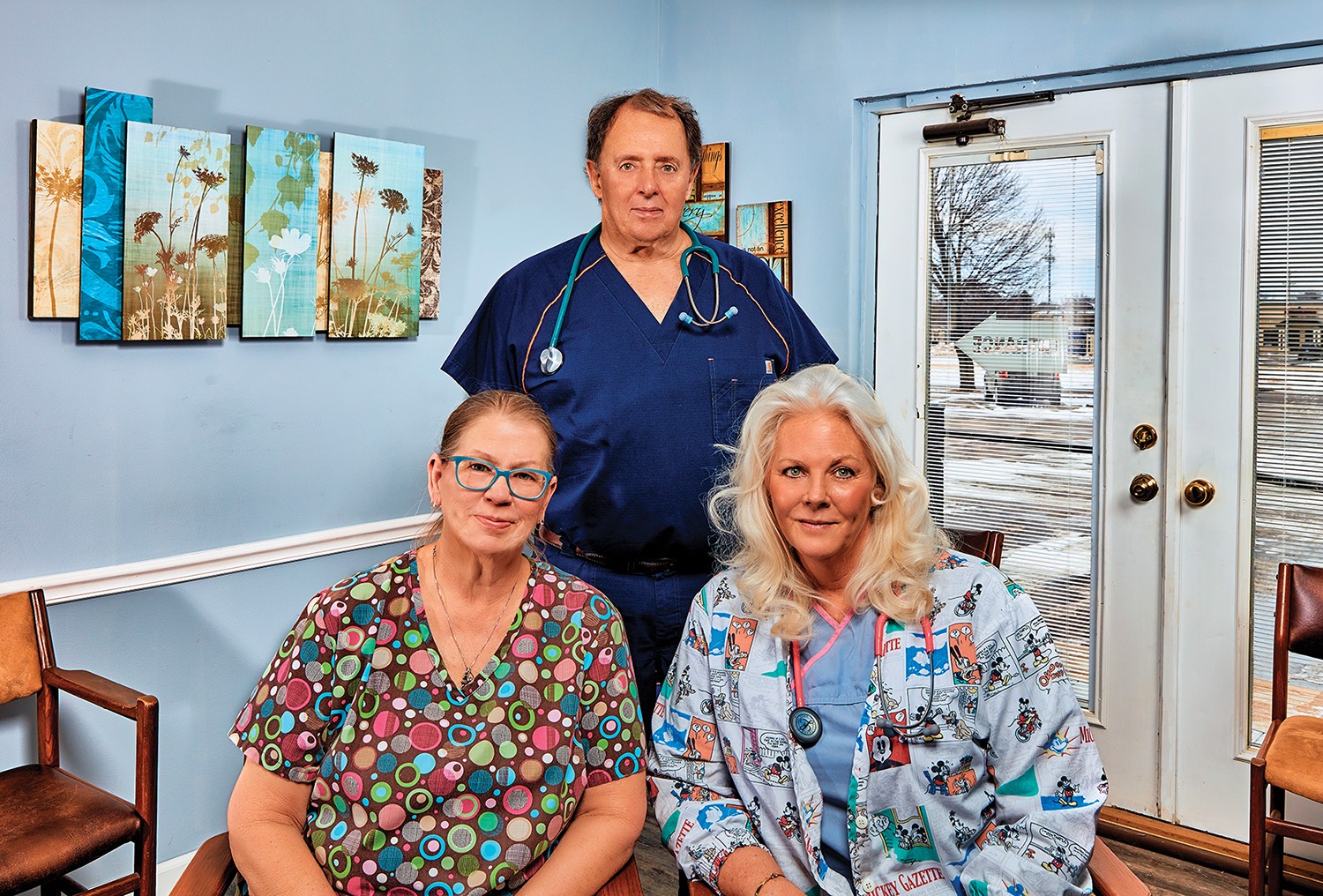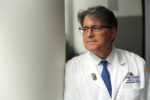From Addiction to Hope

One Local Doctor’s Commitment to Helping Individuals Overcome Opioid Addiction
Addiction is an everyday battle; recovery is also a struggle, but one that can gives its followers improved quality of life.
Photos by Tom Barnhart
Last year, President Trump declared the opioid crisis a public health emergency. Some may wonder exactly how bad it is, but the statistics speak for themselves. Drug overdoses are the leading cause of death for Americans under the age of 50, and those deaths are on the rise, mainly because of opioids. According to the New York Times, overdoses killed more people last year than guns or car accidents and are doing so at a pace much faster than the H.I.V. epidemic at its peak. In 2015, one in 50 people in the United States died at the hands of opioids and it is reported over two million American are estimated to have an opioid addiction. Of the 97 million people who took prescription painkillers in 2015, 12 million did so without being under the direct supervision of a doctor.
What is an opioid? The first drug under this classification was opium, a narcotic derived from a type of poppy. From opium, a host of other drugs were derived sharing similar properties. The list might be somewhat familiar: morphine, heroin, Vicodin, Percocet and OxyContin, all collectively known as opiates. Additionally, there are certain synthetic opiates that are not plant-based that fall under the category of opioids, and those are mainly methadone and fentanyl.

Lewis Rosenblatt, D.O.
What do these opiates do? The job of opioids is to regulate pain in the body. They are fierce competitors in the world of pain killers, which is great for the patient, but they are highly addictive. While addiction to this drug dates back thousands of years, the current crisis began in the 1980s and has substantially risen over the years as marketing and an enhanced focus on patient satisfaction led to more availability of pharmaceutical narcotics. While it would make sense to just stop prescribing these medications, they are a major part of modern medicine and have greatly improved the quality of life for so many people. Unfortunately, these drugs carry a risk of addiction, and that is where Dr. Lewis Rosenblatt comes into play. His philosophy on treating patients points to sincere help and support, not judgment. While family practice is his specialty, his heart has been swayed dramatically to helping individuals who have fallen prey to the wraths of opioid addiction.
A comforting blend of innate East Coast confidence and charisma, coupled with charming Midwestern hospitality, Dr. Rosenblatt presents not only as an esoteric fountain of knowledge, but also as someone who will truly have his patient’s best interests at heart. Four years ago, he decided to expand his medical practice to include treating patients with drug addiction issues. He became licensed to prescribe Suboxone, also referred to as Zubsolv, and generically known as Buprenorphine and Naloxone, an opioid medication used to treat opioid addiction in the privacy of a physician’s office. Suboxone is a mixture of Buprenorphine and Naloxone. Buprenorphine takes away the feeling of withdrawal while Naloxone cancels out the opiate in the addict. This makes the use of opiates almost impossible.
“Some police now carry Naloxone injectable to treat an acute opiate overdose,” indicated Dr. Rosenblatt.
Certainly, his family practice is highly important to him, but he also has a decided passion for treating those with opioid dependency.
A graduate of Kansas State University and Kansas City University of Medicine and Biosciences, Dr. Rosenblatt practices in Independence, Missouri. He is board certified in Family Practice and is accredited by the American Osteopathic Board of Family Physicians. He brings more than 48 years of diverse experiences to the table, most notably as related to family practice medicine and emergency medicine.
Over the last several years, however, Dr. Rosenblatt has experienced the challenges and the rewards in assisting patients on the road to recovery from opioid addiction. He is one of a handful of clinicians in the area certified to prescribe buprenorphine, and as a result, is seeing increasing numbers of patients who desire to break free from the chains of addiction and embrace a heathier lifestyle.
“Opioid mediations give the user a different high than pot,” noted Dr. Rosenblatt, referring to its intense addictive pull. “The use of the pain medication can sometimes start as the result of an injury or surgery which can take a long time to heal. Then when the patient starts to heal and the pain is improving, they may begin to miss the feeling associated with the medication, so they will ask their doctor for more.”

That is the first step down the perilous path of addiction. The individual will continually seek out that euphoric high associated with the drug and may appeal to the doctor with any number of excuses in order to get a new prescription: Someone stole my medication. I lost it. My dog ate it. Whatever it takes to get the doctor to refill the prescription will take the stage, and not all doctors will necessarily respond in equal fashion. According to Dr. Rosenblatt, some physicians treating patients with chronic pain may take them off of the opioids and refer them instead to Tylenol or Ibuprofen, which are not controlled substances. Unfortunately, over usage of those over-the-counter medications can lead to liver failure.
“Every over-the-counter medication has a limit in dosage,” explained Dr. Rosenblatt. Conversely, he noted that for those with intense pain, those over-the-counter remedies are not strong enough to alleviate the discomfort. Perhaps a patient is referred to a pain management specialist after a certain surgery, and that pain management specialist continues to prescribe the opiates. It can become a vicious cycle that may eventually spin out of control.
Already treating approximately 225 patients, Dr. Rosenblatt can prescribe buprenorphine with naloxone. Patients may come to him on the referral of others or by discovering online that he is a local practitioner with the ability to prescribe the medication they need to get them off of the opioids.
One of the main draws for Dr. Rosenblatt when it comes to treating those addicted to opioids came from his own experiences while working in emergency rooms.
“I always felt so hopeless in treating opiate addicts,” he reflected. “And many doctors in the ER just gave the person what he or she wanted and that was it.”
Dr. Rosenblatt simply grew tired of the routine scenarios to which he bore witness: patients arguing with the doctors; security being called in; patients being kicked out of the ER; and so much more. When he stumbled upon a course in Medical Outpatient Treatment of Opioid Dependency while at a conference in Myrtle Beach several years ago, he discovered there is a way to help those exact people he originally felt hopeless to help.
“Unless you give a patient something to get them into withdrawal, nothing will happen,” he said. Shortly thereafter, he became certified to administer the buprenorphine with naloxone.
“It’d be terrible if mankind didn’t have these drugs to help with pain, but there also needs to be a way to help those who have become addicted,” emphasized Dr. Rosenblatt. “What heals the brain is not using opiates, and we get the patient there through the use of buprenorphine. The longer one is away from opiates, the more the brain heals. I also tell my patients that recovery is a lifelong process, and we encourage them to seek counseling either through Narcotics Anonymous or some other addiction recovery group or individual counseling setting.”
The immediate results from the administration of the buprenorphine is not lost on the patients at all.

Dr. Rosenblatt with Becky Robertson, Office Manager (left) and Shelly Crane, Medical Assistant
“This is truly a game-changer for these people and they are amazed at how much better they feel,” said Shelly Crane, Medical Assistant for Dr. Rosenblatt. “Not just any doctor can prescribe buprenorphine, and we have a specific process for treating patients.”
That process includes an initial consultation, usually by phone, to determine what drug(s) the patient is abusing and how much they are abusing.
“We request that they refrain from using for 24 to 72 hours before they come into see us, as we want them to be in a slight state of withdrawal when they come in. If they have the drugs in their system, they will go into severe withdrawals upon taking the buprenorphine,” she said.
The drug is administered sublingually (under the tongue), the effects of which the patient will feel in about 20 minutes.
“The will notice themselves feeling better right away,” said Crane. “We will typically keep the patient at the initial dose on a daily basis for about six months and then taper then down to a daily goal of two milligrams or less. In the first month, we like to see the patient three times and from there we see them on a monthly basis, along with our recommendation for outside counseling.”
Dr. Rosenblatt is also thrilled to be in a position to educate medical and nursing students from the University of Kansas Medical School and other hospitals with nurse practitioner programs, stressing the importance of educating these younger clinicians not only about the opioid crisis but also ways by which to deal with it.
“We need more physicians treating opiate addicts,” he stated.
Dr. Rosenblatt noted that some patients express feeling “normal” afterwards, although a few have suggested that they do not even recall what “normal” feels like. Nevertheless, patients come from all over for treatment by Dr. Rosenblatt, as they have come to rely on his expertise yet feel equally inspired by his unwavering compassion.
“It’s great to see people get their lives back,” he said.
Admittedly, adhering to recovery is a lifelong process. Some people do fail. Others do not, and in the upswing to recovery, patients are so appreciative for what Dr. Rosenblatt and his team have given them: Hope for a better life.
For more information on Dr. Lewis Rosenblatt, call 816.229.3200 or visit him at the Rosenblatt Clinic at 4621 S. Shrank Dr., Suite B in Independence, Missouri 64055. For more information on buprenorphine treatment, go online at naabt.org.






